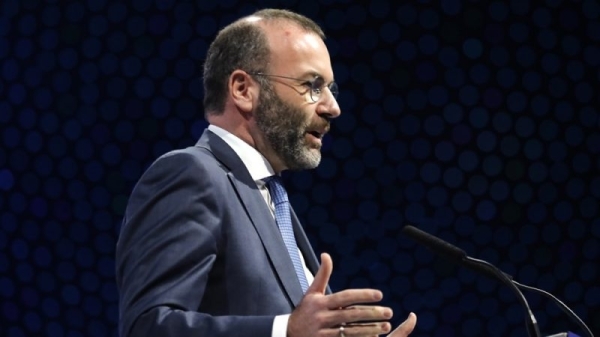Bavarian conservatives want to kill Spitzenkandidat system

The Bavarian conservative Christian Social Union’s (CSU) call for the lead candidate principle to be dropped in next year’s EU elections has caused much stir in Germany, where the system has often been praised as the holy grail of democracy.
According to the Spitzenkandidat system, if the leading candidate of a European political family wins the EU elections and gets the majority in the European Parliament, then he or she takes over the presidency of the European Commission.
However, while former Commission president Jean-Claude Juncker was nominated under the Spitzenkandidat system as the ‘top candidate’ of the European People’s Party (EPP), his successor, Ursula von der Leyen, was selected by EU leaders behind closed doors.
Ahead of the 2024 EU elections, it seems there is not much appetite to follow such a system.
Czech MEP Jan Zahradil (ODS, ECR), who ran as the ECR Spitzenkandidat in the 2019 European elections, recently told EURACTIV.cz that the concept of the Spitzenkandidat is “quietly dying, quietly fading away. No one is actually talking about it anymore.”
Read more: MEP: Spitzenkandidat idea slowly fading away
But many conservatives were taken aback.
“We need more democracy in Europe, not less,” Hildegart Bentele, MEP for the German Christian Democrats (CDU), commented on Twitter.
While the lead candidate system is enshrined in the statutes of the European People’s Party (EPP), of which both the CSU and the CDU are members, it would technically allow for more than one candidate simultaneously.
This would allow the Bavarian CSU to spotlight its own party members more during the election – most prominently, the head of the EPP, Manfred Weber. According to EURACTIV’s information, Weber wanted the Spitzenkandidat system to be applied.
Even if there will be no single lead candidate, “personalisation would still play a major role in the European election,” Tobias Winkler, CSU member of the EU affairs committee in the Bundestag, told EURACTIV.
“Weber will be one of the main personalities in the upcoming campaign. He will play a central role during the EU election campaign in Bavaria, where he is well known,” he added.
While European Commission President von der Leyen has not yet announced that she will run again, it is widely expected that she will lead the EPP into the next election.
Weber, the Spitzenkandidat for the EPP in the previous EU election campaign in 2019, was sidelined in favour of von der Leyen instead, effectively killing the lead candidate system – an incident the CSU remembers and for which it blames the European Parliament for caving into member state pressure.
“The Spitzenkandidat system was torpedoed and thus called into question by the Parliament itself at the last election,” Alexander Radwan, member of the EU affairs committee in the Bundestag, told EURACTIV.
The upcoming European election will be one of the hot topics on Friday when top EPP politicians meet for the Munich political assembly.
If the system is not followed, the EPP should also change its statutes but will need a congress for this.
Turmoil over ongoing investigation
The meeting in Munich is taking place on the backdrop of an ongoing inquiry by German authorities into alleged corruption related to the 2019 elections.
The case was made public after the German and Belgian police raided the EPP headquarters earlier this month.
In the spotlight is Christian Democrat (CDU) lawmaker Mario Voigt, the digital campaign manager for EPP leader Manfred Weber during the 2019 EU election campaign.
According to German media reports, the inquiries have zoomed in on the procedure for awarding contracts for the digital campaign to companies in Thuringia, Germany.
Mario Voigt has consistently denied any wrongdoing.
But what has caused turmoil in the party is who hired Voigt and if the contracts in question have been lawfully awarded.
The EPP seems to be divided over the matter. Some claim that Weber was not “administratively” involved.
Others insist that Voigt was Weber’s personal choice after he was recommended by Udo Zolleis, the current head of the EPP’s Group’s strategy unit and Weber’s right-hand man, who has already testified about the case before the authorities.
Dara Murphy, the then campaign director, approved the outsourcing of contracts, but an EPP source told EURACTIV he was signing because he was “pushed to do so” by Weber.
The ‘Bavaria-Madrid-Athens axis’
EURACTIV was informed that there is also much “nagging” as after Weber took over the party’s presidency, many employees were fired “overnight” and were replaced by “outsourcing companies”.
Speaking to EURACTIV about the current situation, an EPP source in Berlin talked about a dominant “Bavaria-Madrid-Athens axis” in the right-wing family after Weber took over, which has disturbed some “traditional” centre-right members.
Weber enjoys the support of Greek PM Kyriakos Mitsotakis, who is now strong in the party considering that he is one of the few conservative leaders in power.
Mitsotakis is facing a tough race ahead of the 21 May elections in Athens, and it’s uncertain that he will be re-elected. A key element is whether the Partido Popular party in Spain will beat socialist Pedro Sánchez.
On a political level, things get more complex as the relations between Weber and von der Leyen are “problematic”.
Rumours in Brussels also suggest that Metsola is disturbed by Weber’s portrayal of her as “his choice” in the EU House’s presidency.
Several sources confirm that the Greek and Spanish elections will be determining regarding Weber’s future in the EPP.
(Oliver Noyan | EURACTIV.de, Sarantis Michalopoulos | EURACTIV.com)
Read more with EURACTIV




